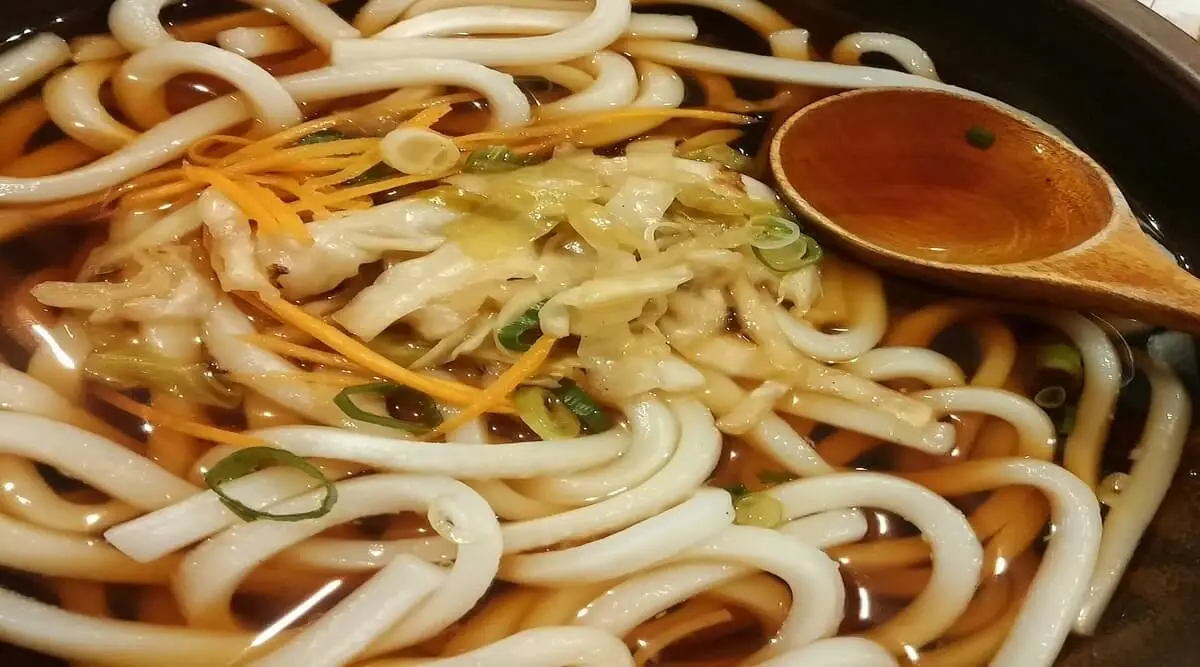Noodles are a very popular food in various countries around the world, and we can buy them in different presentations. Noodles contain a high concentration of carbohydrates (carbohydrates) and vitamin B, which means low fat content.
Since it is a highly consumed food on a global scale, it is common to wonder if eating it causes an increase in your weight.
In this article, we will focus on the consumption for dinner because many people prefer to eat it at that specific time of the day.
Do noodles make you fat?
Actually, noodles do not directly make you gain weight. Putting on more pounds is associated with various factors, mainly oriented to your general diet, portion size and level of physical activity.
Having said that, noodles are a food rich in carbohydrates, typically made from wheat flour, rice or other grains, which are a source of energy and can be part of a balanced diet.
In that sense, the key to weight control is the total number of calories you consume versus the number of calories you burn.
Here are some important criteria to consider to avoid gain weight because of this food:
Calories
Keep in mind, noodles contain calories, and if you constantly eat more calories than your body needs, you can gain some extra weight. This goes for any food, not just noodles.
Serving size
You should pay attention to portion sizes when eating noodles, as eating large portions will increase calorie intake.
Preparation
It is also relevant to know how noodles are prepared since noodles in their simple form are relatively low in calories, but certain preparations, such as noodles fried or those served with high-calorie sauces, can significantly increase the caloric content of the dish.
Accompaniments
Consider what you eat alongside noodles, adding high-calorie ingredients such as fatty meats or creamy sauces can increase the total calorie content of the meal.
Balance diet
Remember that weight control is not just about food, it’s all about the overall balance of your diet. Therefore, you should include a variety of nutrient-dense foods such as vegetables, fruits, lean proteins, and healthy fats, along with your noodle dishes.
Activity level
Regular physical activity helps burn calories and contributes to general well-being. A sedentary lifestyle combined with excessive consumption of noodles can lead to weight gain.
Eating noodles at night make you fat
Eating noodles at night will not necessarily make you fat, as weight gain is determined by the overall balance between the number of calories you consume and the number of calories you burn through daily activities and your metabolism.
It is important to mention that for weight control, it’s your total caloric intake and the overall composition of your diet that matter, not the specific time you eat certain foods.
If you eat more calories than your body needs, either noodles or any other food, you may gain weight over time.
However, there are a few reasons why eating noodles at night might have earned a reputation for contributing to weight gain, such as:
Lack of physical activity
At night, people tend to be less active and consume fewer calories than during the day. In that sense, if you eat a large portion of noodles and then lead a sedentary lifestyle, you may not burn excess calories consumed, which will lead to weight gain.
Noodle preparation
Some noodle dishes can be high in calories, especially if they are deep-fried or loaded with high-calorie sauces or ingredients like cheese, butter, or fatty meats.
Eat excessively
People tend to over-eat at night, especially when it comes to comfort foods like noodles. This is why consuming larger portions than necessary can lead to excess in calorie intake.
Digestion
There is a belief that eating heavy meals close to bedtime can negatively affect sleep and digestion. Poor sleep patterns can indirectly influence weight gain by affecting hormone regulation and appetite control.
To maintain a healthy weight, it’s important to focus on overall dietary balance and portion control, regardless of the time of day.
If you like noodles, consider opting for healthier preparations such as whole grain noodles with lots of vegetables and lean protein.
Eating noodles while losing weight
If you’re trying to lose weight while enjoying noodles, it may be possible to do so by making a few adjustments to your diet and overall lifestyle.
Here are some tips for incorporating noodles into a weight loss plan:
- Go for whole grain noodles: You can opt for whole grain or whole wheat noodles instead of refined ones. Whole grains provide more fiber and nutrients, and can help you feel fuller for longer, reducing the chances of overeating.
- Control portion size: Be aware of the portion sizes. Stick to smaller portions and pair them with plenty of vegetables and lean protein to create a balanced meal.
- Sauces: Pay attention to the sauces you the sauces that you add to the noodles. Creamy, high-calorie sauces can add significant extra calories. Consider using lighter options like tomato-based sauces or lower-calorie alternatives.
- Add vegetables: Incorporate a variety of vegetables into your noodle dishes as these are low in calories and rich in nutrients, making your meal more satisfying without adding a lot of calories.
- Limit Fried Noodles: Avoid fried noodle dishes as they tend to be higher in calories and unhealthy fat. Opt for steamed, boiled, or stir-fried noodles instead.
- Balanced diet: Noodles should be only one part of a balanced diet. Be sure to get a mix of protein, healthy fats, and other whole foods to meet your nutritional needs while you lose weight.
- Regular Exercise: Combine your healthier noodle options with regular physical activity to create a calorie deficit. Exercise helps burn calories and can support your weight loss efforts.
- Stay hydrated: You should consume plenty of water throughout the day, since, our bodies can mistake thirst for hunger, leading to unnecessary snacking.
- Mindful Eating: Be aware of what and when you are eating, as eating slowly and paying attention to hunger cues can help you avoid over-eating.
- Avoid eating late at night: Try to avoid eating large meals, including noodles, late at night, as your body’s metabolic rate tends to slow down during sleep.
Remember, the key to successful weight loss is creating a sustainable and balanced approach to your diet and lifestyle. Moderation is essential, and it’s okay to indulge in noodles once in a while as long as they fit within your overall calorie and nutrient goals.
If you have specific dietary or weight loss goals, consider consulting with a registered dietitian or nutritionist for personalized guidance.
Ramen or instant noodles: best option for weight loss
Between ramen and instant noodles, neither is considered the best option for weight loss, as both are generally high in calories and low in nutrients.
However, if you’re looking to choose the better option between the two, there are a few differences to consider:
- Ramen: Traditional ramen is a Japanese dish that usually consists of Chinese-style wheat noodles served in a meat or fish-based broth, often flavored with soy sauce or miso, and topped with various toppings such as sliced pork, seaweed, green onions and eggs. While traditional ramen can be quite tasty, it’s also often high in calories, sodium, and unhealthy fats. The added toppings and rich broth can contribute to its caloric content.
- Instant Noodles: Instant noodles are a type of dry, pre-cooked block of noodles usually sold with a seasoning packet, and are convenient and quick to prepare, making them a popular choice for many. However, like ramen, instant noodles are also high in calories, sodium, and often contain unhealthy additives and preservatives. Seasoning packets are often loaded with salt and unhealthy fats, which can be detrimental to weight loss efforts.
If you’re looking to lose weight, it’s best to avoid both traditional ramen and instant noodles as regular staples in your diet. Instead, consider healthier noodle alternatives.
Best noodles for weight loss
There are several healthier noodle options for those concerned about weight gain. It may be beneficial to choose noodles that are low in calories, high in nutrients, and have less of an impact on blood sugar levels.
Below are some healthier noodle options to consider:
Whole grain noodles
You can opt for noodles made with whole grains like whole wheat, brown rice, quinoa, or spelt. Whole grain noodles are higher in fiber, which promotes satiety and can help control appetite.
Vegetarian noodles
Vegetable-based noodles made from zucchini (zoodles), sweet potatoes, carrots, or squash offer fewer calories and carbohydrates than traditional wheat-based noodles. They are a great way to increase your vegetable intake and reduce your overall calorie intake.
Shirataki noodles
These noodles are made from konjac yam flour and are virtually calorie free and very low in carbs. It should be noted that shirataki noodles are a good option for those who follow a low-calorie or low-carb diet.
Lentil or chickpea noodles
Noodles made with lentils or chickpeas are higher in protein and fiber than traditional wheat noodles, making them more filling and satisfying.
Buckwheat noodles (soba)
Soba noodles made from buckwheat are a nutritious alternative to regular wheat noodles. They are rich in nutrients and have a distinctive nutty flavor.
Black bean noodles
Noodles made with black beans are another option that is high in protein and fiber, which can help with satiety and weight management.
Konjac noodles
Similar to shirataki noodles, konjac noodles are made from konjac flour and are very low in calories and carbohydrates.
Portion Controlled Noodle Cups
Look for portioned noodle cups that provide adequate serving sizes to prevent overeating.
Homemade Noodle Recipes
Making your own noodles at home allows you to control the ingredients, including the type of flour used and the amount of fat or salt added.
Soup-based noodle dishes
Noodle soups with broth and lots of vegetables can be more filling and lower in calories than dry noodles with sauce.
Frequently asked questions
Eating noodles every day may be okay in some cases, but it depends on several factors, including the type of noodle (nutritional content), portion sizes, method of preparation, level of physical activity, and your dietary and health goals. generals.
The caloric content of noodles can vary depending on the type of noodles, the ingredients used, and the serving size. In general, noodles made with refined wheat flour (white flour) tend to be higher in calories compared to noodles made with whole grains, vegetables, or legumes.
Eating noodles as part of a meal, rather than on its own, can generally be a better weight management strategy. Incorporating noodles into a balanced meal that includes a variety of nutrient-dense foods offers several advantages.
However, remember that portion control and overall caloric intake are crucial factors in weight management. Even when eating noodles as part of a meal, keep portion sizes in mind and avoid over-eating. Also, consider the type of noodles you’re consuming: Whole-grain or vegetable-based noodles are generally healthier options than refined or instant noodles.
Fiber plays an important role in noodles and has a profound effect on satiety, which is the feeling of fullness and satisfaction after a meal. Noodles made with whole grains or certain vegetables are generally higher in fiber compared to traditional refined wheat noodles. To maximize the satiating effects of noodles, consider choosing whole grain noodles or vegetable-based noodles like zucchini noodles, sweet potato noodles or lentil noodles
Conclusion
Noodles themselves do not produce any increase in body weight since it is conditioned by factors such as: diet, portion size and the level of physical activity.
Remember to take into account our recommendation regarding the weight that you may gain when eating noodles:
- Check the number of calories.
- Pay attention to the size of the portions you consume.
- The way of preparing the mimes (If they are prepared with oil or served with high-calorie sauces, they can significantly increase the caloric content of the dish).
- Be alert when high-calorie ingredients are added.
- Have a balanced diet.
- Frequent practice of physical activity (Remember that a sedentary lifestyle, combined with an excessive consumption of noodles can cause considerable weight gain).
Definitely, the priority objective is to maintain a healthy diet, enjoying a balanced and nutrient-balanced diet, together with an active and healthy lifestyle.

A. Neomar Evies es un profesor graduado y licenciado en informática. Investigador y conferencista que ha participado en diferentes eventos en diversos países. Tiene amplia experiencia en el campo de la gestión deportiva y el deporte de alto rendimiento y salud deportiva del atleta. También tiene un doctorado en Ciencias del Deporte y un Máster en administración. Como escritor ha escrito tres libros sobre sistemas de información centrados en Gestión y Deportes.





